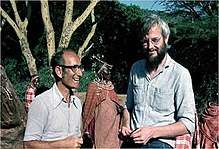Georges J. F. Köhler
Georges Jean Franz Köhler (April 17, 1946 in Munich – March 1, 1995 in Freiburg im Breisgau) was a German biologist.
Georges Jean Franz Köhler | |
|---|---|
 César Milstein and Georges Jean Franz Köhler | |
| Born | April 17, 1946 |
| Died | March 1, 1995 (aged 48) |
| Nationality | German |
| Known for | monoclonal antibodies |
| Awards | Nobel Prize in Physiology or Medicine in 1984 |
| Scientific career | |
| Institutions | Max Planck Institute of Immunobiology |
| Doctoral advisor | Fritz Melchers |
Together with César Milstein and Niels Kaj Jerne, Köhler won the Nobel Prize in Physiology or Medicine in 1984, "for work on the immune system and the production of monoclonal antibodies". Milstein and Köhler's technique for producing monoclonal antibodies laid the foundation for the exploitation of antibodies for diagnostics, therapeutics and many other scientific applications.
Career
In April 1974 Köhler started a post-doctoral research fellowship at the Laboratory of Molecular Biology in Cambridge, UK where he began working with César Milstein to develop a laboratory tool that could help them investigate the mechanism that underlies the diversity of antibodies. It was during this work that they devised their hybridoma technique for the production of antibodies. Köhler continued his collaboration on the technique when he returned to Basel Institute of Immunology in April 1974.[1] Köhler remained at the Basel Institute for another nine years, during which time he continued investigating antibody diversity and in the early 1980s began working on the development of transgenic mice as a tool to understand the mechanism that underlies self-tolerance. In 1986 Köhler became director of the Max Planck Institute of Immunobiology where he worked until his death in 1995.[2] [3]
Personal life
Kohler's father, Karl, was a German, while his mother, Raymonde, belonged to a French family. He married Claudia Reintjes in 1968. His first meeting with Claudia was held when he was doing university studies while Claudia was a physician's assistant. They had three children: Katharina, Lucia and Fabian. He not only worked hard for refining antibodies but also gave his time to his family. He used to do some taxi driving to support his family. Most of the he spent with his children while driving small tractor on roads and enjoying roller-skating in streets [4]
References
- The Story of César Milstein and Monoclonal Antibodies.
- http://www.whatisbiotechnology.org/people/kohler
- K. Eichmann, Köhler's Invention (Birkhäuser Verlag, Basel, 2005) University of Freiburg Faculty of Biology
- "Professor Georges Kohler | Biographical summary". WhatisBiotechnology.org. Retrieved 2019-11-12.
- G. Köhler & C. Milstein (1975). "Continuous cultures of fused cells secreting antibody of predefined specificity". Nature. 256 (5517): 495–7. Bibcode:1975Natur.256..495K. doi:10.1038/256495a0. PMID 1172191.
- István Hargittai (2006). "Köhler's Invention". Journal Structural Chemistry. 17 (1): 161–162. doi:10.1007/s11224-006-9042-0.
- Melchers, F (1995). "Georges Köhler (1946-95)". Nature. 374 (6522) (published Apr 6, 1995). p. 498. Bibcode:1995Natur.374..498M. doi:10.1038/374498a0. PMID 7700372.
- Danon, Y L (1996). "[Monoclonal antibodies: George Kohler]". Harefuah. 130 (2) (published Jan 15, 1996). pp. 108–9. PMID 8846970.
External links
- http://www.nobel.se/medicine/laureates/1984/
- https://www.nobelprize.org/nobel_prizes/medicine/laureates/1984/kohler.html